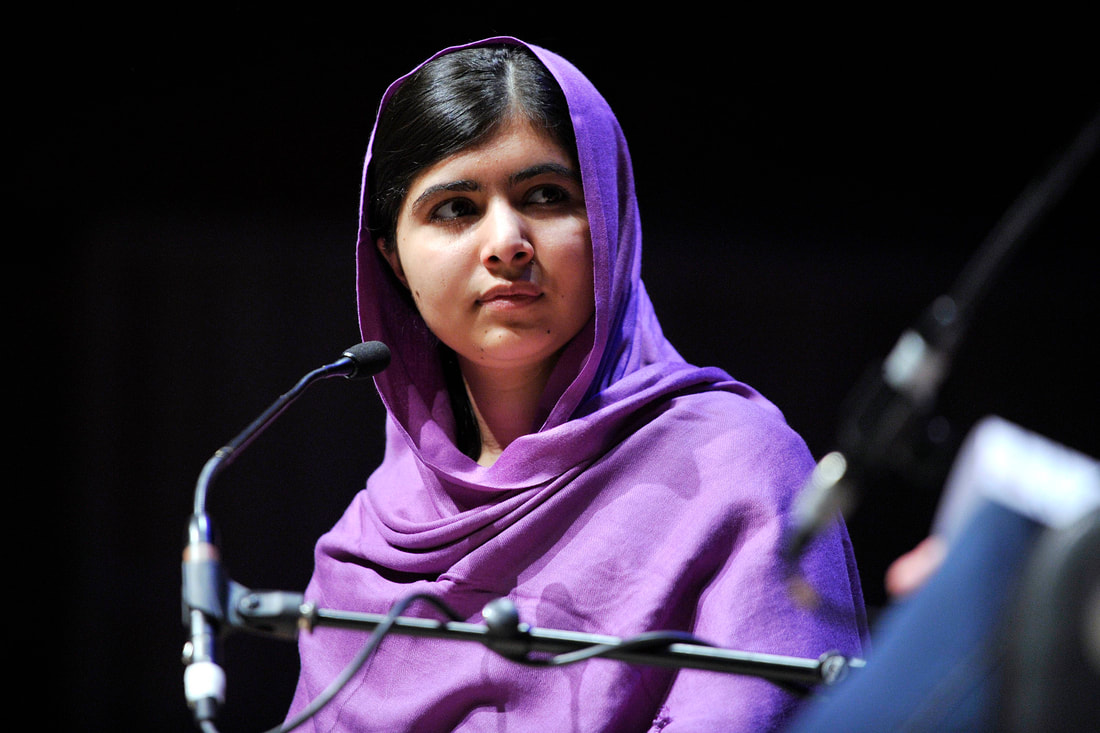|
By: C. Paixão Malala Yousafzai, a 24-year-old advocate for women’s rights and their education, was born in July 1997 in the city of Mingora, Pakistan. At a very young age, she expressed interests in helping the community and making a change with her brilliant mind. Malala attended an all-girls’ school in her home city, which was run by her father, a passionate advocate himself. However, in 2007, everything changed. Malala was 10 years old when the Taliban took control of Mingora and became the dominant socio-political force in Pakistan. Consequences of this new powerful group included the banning of girls’ right to attend school and receive any sort of education. Many cultural activities, like watching television, was prohibited, and by the end of 2008, 400 schools had been destroyed, all of which offered education for girls.
As a young, opinionated advocate of women’s rights, Malala refused to surrender to the Taliban and decided to fight against them; fight for her own rights. On national television, a Pakistani news broadcast, Malala spoke up for all women in Pakistan: “How dare the Taliban take away my basic right to education?”. In 2009, at the age of 11, Malala started to anonymously write for a blog on BCC where she expressed her opposition towards the Taliban and questioned their motives. In this blog, Malala also described her life in Pakistan as a girl and how she was being oppressed by the Taliban, criticising their methods. Her voice become louder and clearer, and over the following three years, she and her father became well-known throughout Pakistan as advocates for excellent and free education to Pakistani girls. They became known for their determination towards reaching this goal, and in 2011, at the age of 15, Malala was nominated for the International Children’s Peace Prize and awarded the Pakistan’s National Youth Peace Prize. On October 9, 2012, Malala was sat on the bus heading home from school when two members of the Taliban stopped the vehicle. One of the Talibs asked for Malala by name and followed by shooting at her three times. One of the bullets entered and exited through her head. She was taken to a Pakistani military hospital in Peshawar on the same day, then four days later to a critical care facility in Birmingham, England. Malala stayed in coma for 10 days, undergoing emergency surgeries, leading to her loss of hearing in one ear. Malala’s amazing recovery and return to school prompted a global outpouring of support; people were sympathising with her on a global scale and the situation of the girls in Pakistan. On Malala’s 16th birthday in 2013, she travelled to New York and spoke before the United Nations, fighting for a fairer society in Pakistan and for better conditions for women and girls. She appealed to the United Nations to address them about her current situation and for help. She soon released her first book, an autobiography called “I Am Malala: The Girl Who Stood Up for Education and Was Shot by the Taliban”. She was given the renowned Sakharov Prize for Freedom of Thought and Speech by the European Parliament on October 10, 2013. In 2014, Malala co-founded, alongside her father, the “Malala Fund” and travelled to many countries such as Jordan, Kenya and Northern Nigeria, where she visited refugees, met young female students and spoke up for women’s rights to education. In Nigeria, Malala spoke in favour of three abducted girls who had been taken earlier that year by Boko Haram, a terrorist organisation that resembles the Taliban in many ways. She also spoke in favour of women’s rights, as the Nigerian terrorist group aimed to violate that. In October of that same year, 2014, Malala was awarded the Nobel Peace Prize at the age of 17 for all her work devoted towards women’s rights and education, becoming the youngest ever winner. She spoke some words when accepting this announcement: “This award is not just for me. It is for those forgotten children who want education. It is for those frightened children who want peace. It is for those voiceless children who want change”. Malala has empowered and served as an inspiration to women and girls worldwide, and through her fund, has helped many countries and girls who suffered from government oppression and violations of their rights. Malala, now 24 years old, remains an advocate for the power of education and for girls to become representatives of change in their countries and communities. Sources: https://www.nobelprize.org/prizes/peace/2014/yousafzai/biographical/ https://www.bbc.com/portuguese/internacional-58240166 https://www.britannica.com/biography/Malala-Yousafzai
0 Comments
Leave a Reply. |
Categories
All
Archives
June 2024
|

